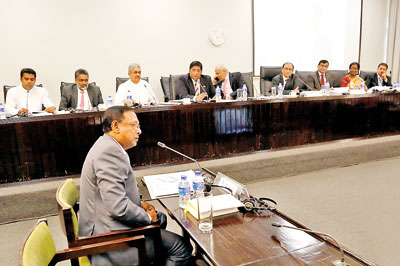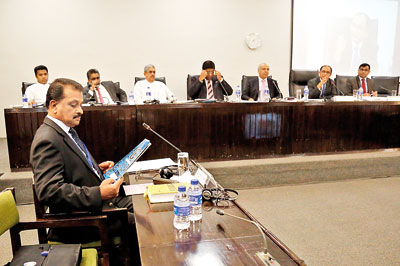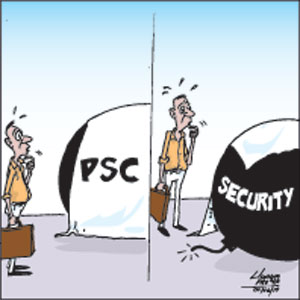News
Dismissive stance on serious intelligence warning on impending terror attacks
- PSC hears shocking revelations from Defence Secretary and National Intelligence Chief
- Some elements are trying to create ethnic tensions; added burden on security forces
For first time in the country’s Parliamentary history, the media were given access to report the proceedings of a PSC this week. “This is a new kind of experience and experiment in opening the doors to the media during PSC probes, in order to establish transparency in the governance and legislature affairs,” Acting Chairman Jayampathi Wickremaratne noted, while emphasising that the media should be careful in ensuring accuracy and a non-partisan way of reporting on the proceedings of individual testimonies given by top officials before the committee.

Defence Secretary Shantha Kottegoda
In his opening remarks before the hearing on Wednesday (29), Dr. Wickremaratne recalled the significant damage the deadly terrorist attacks caused to the social fabric of the nation and added that the main challenge ahead of us today is rebuilding those ties between the people and trust between various communities.
Emphasising that the PSC members have to play a different role in the committee, he urged them to get rid of the clothing of typical politicians and engage in the legislature’s check-and-balance mechanism to pave the way for legal action if the government so decides in future.
Appearing before the PSC on the first day, Wednesday, were two top officials of the government security apparatus — Defence Secretary Shantha Kottegoda, and National Intelligence Chief Sisira Mendis. They testified after taking oaths. At the outset of the hearings that went on for more than six hours, Dr Wickremaratne urged witnesses not to divulge any sensitive matters related to national security or reveal intelligence gathering strategies in detail.
General (Rtd) Shantha Kottegoda, who assumed duties just three weeks ago after his predecessor was fired following the attacks, acknowledged that “there appears to have been a grave lapse in the intelligence network” when coordinating among different agencies prior warnings of an imminent attack, but he sought more time from the committee to explain this lapse in detail because investigations were still not complete. Responding to a question by Chair, Gen. Kottegoda made it clear he reports directly to the President, as he is the Minister of Defence.
PSC member Ashu Marasinghe posed the question if there were any effective tracking mechanisms currently in place on border control security and biometric data of those who visit the country along with details of arrivals and departures of foreigners.
Gen. Kottegoda responded that he had taken an initiative with the assistance of relevant departments such as Department for Registration of Persons, Department of Immigration and Emigration and Sri Lanka Customs to implement such a programme in the near future. “As of now, there is no mechanism in place to get visa details of a person in advance when he boards a flight to Sri Lanka,” he said.
On questions raised about the efficiency of the intelligence community in the wake of the attacks, Gen. Kottegoda rejected charges that the intelligence network had collapsed with the arrest of certain intelligence operatives over various allegations. He pointed out that there was an effective intelligence network currently at play, with 99 percent of the immediate threat from terrorism being neutralised.

National Intelligence Chief Sisira Mendis testifying before the PSC. Pix by M.A. Pushpa Kumara
Field Marshal Sarath Fonseka inquired extensively whether the Defence establishment was aware of the Islamic fundamentalist groups that were emerging in various parts of the country and the state of those ongoing probes if files were kept open. Gen Kottegoda replied that the Ministry came to know about the activities of these radical Islamic groups in 2017 and agreed to provide the relevant files to the Committee.
PSC member Ravi Karunanayake drew attention to last week’s Sunday Times page one story which said that Zahran Hashim, the mastermind behind the Easter Sunday attacks, had an open arrest warrant since last year and monitoring moves became paralysed after the arrest of Terrorism Investigation Division (TID) Chief Nalaka Silva. The Committee decided to consider the news report as one of the items of evidence placed before committee.
During the hearing, Gen. Kottegoda expressed concern that some elements are trying to form a new ethnic issue by instigating ethnic tensions between communities, while referring to a protest staged in Kurunegala this week. He elaborated that the security forces and intelligence networks, along with the Special Task Force (STF), have to engage in riot control activities in addition to their around-the-clock patrolling to ensure civilian security across the country. This, according to him, became an additional burden on the security forces.
National Intelligence chief Sisira Mendis, a retired Senior Deputy Inspector General of Police, in his testimony, said that after he assumed duties as Chief of National Intelligence (CNI) in July 2015, the first time that the Islamic State (ISIS) was discussed at the weekly Intelligence Coordination Meeting (ICM) was on October 6, 2015. A discussion was held that day on new regulations to be formed to address religious extremism and countering emerging terrorist threats. ISIS was the main focus of this discussion, he added.
 Zaharan Hashim’s name had first come up in discussions at the ICM in March, 2017, following a clash between two groups of Muslims in Kattankudy, Mr Mendis revealed. It was noted that Zahran was spreading extremist views. “That was the first time I heard of him,” the CNI said, adding that he believes the TID even obtained a warrant for his arrest.
Zaharan Hashim’s name had first come up in discussions at the ICM in March, 2017, following a clash between two groups of Muslims in Kattankudy, Mr Mendis revealed. It was noted that Zahran was spreading extremist views. “That was the first time I heard of him,” the CNI said, adding that he believes the TID even obtained a warrant for his arrest.
PSC member Nalinda Jayathissa pointed out that, in the aftermath of the attacks, certain individuals and groups, including Bodu Bala Sena General Secretary Ven. Galagoda Aththe Gnanasara Thera and some Muslim Moulavis, had publicly claimed that they had given information regarding Zaharan and his associates to the authorities but that no action had been taken. The CNI said he was unaware of any specific information given by such individuals.
The Committee then decided to summon all those who claimed to have given information.
Responding to questions, the CNI also said the National Security Council (NSC), the topmost decision-making body dealing with the country’s national security, had not met after February 19. After the meeting on February 19, there were no further meetings of the NSC till after the attacks.
This meant that intelligence about an “Alleged Plan of Attack” that had first been received in early April was never discussed at the NSC, it was revealed.
The CNI said he had received a letter dated April 7 from the Director of the State Intelligence Service (SIS) Nilantha Jayawardena under the topic “Alleged Plan of Attack.” There was no mention of where the intelligence had come from. Since April 7 was a Sunday, it was only the following morning (April ![]() that he found the letter at his office. Though he wanted to speak to the then Defence Secretary Hemasiri Fernando on the matter, he did not get an opportunity to speak to Mr Fernando till about 3 p.m. that day, as April 8 was a busy day since the Indian Defence Secretary was also in Colombo. The CNI added that it did not seem as if the Defence Secretary was aware of the information till he spoke to him about it.
that he found the letter at his office. Though he wanted to speak to the then Defence Secretary Hemasiri Fernando on the matter, he did not get an opportunity to speak to Mr Fernando till about 3 p.m. that day, as April 8 was a busy day since the Indian Defence Secretary was also in Colombo. The CNI added that it did not seem as if the Defence Secretary was aware of the information till he spoke to him about it.
Though the Defence Secretary had said the matter should be taken up at the weekly ICM due to be held the following day (April 9), the SIS Head, who had sent the letter, did not bring the subject up at the meeting, Mr Mendis stated. “I kept the letter on my table throughout the meeting waiting for it to be taken up, but when it wasn’t, I told the SIS Head towards the end of the meeting that we should discuss it. He claimed he had already informed the Inspector General of Police (IGP) about it,” he said.
Acting Chair Dr Wickramaratne expressed his dismay that an intelligence warning of an “imminent attack” was not given priority at the ICM. He asked: “Are you telling this committee that this intelligence information did not become a key topic at the meeting on April 9?”
“That is correct. It was not a key topic,” CNI Mendis acknowledged.
Nevertheless, the CNI said he himself sent his own letter to the IGP on behalf of the Defence Secretary on the same day about the alleged imminent attack. “I used ‘Eyes Only,’ which is a term used in intelligence circles to indicate top priority, to mark the letter. I even informed the person going to hand over the letter to Police Headquarters to get the name and contact details of the officer who will accept the letter. I still have those details,” he added.
The CNI, though, said he did not receive a response from the IGP until the attacks occurred on April 21.
Field Marshal Fonseka faulted the then Defence Secretary for not taking up the matter at the ICM. “If you (CNI) spoke to the Defence Secretary about this on April 8, there was no reason for him to wait for the SIS Director to bring it up on April 9. He (Defence Secretary) presided over this meeting. He should have taken it up on his own as he had a responsibility to do so and take necessary action,” he emphasised.
The Committee consists of MPs Rauff Hakeem, Ravi Karunanayake, Field Marshal Sarath Fonseka, Prof. Ashu Marasinghe, Dr Jayampathy Wickramaratne and Dr Nalinda Jayathissa. The Committee Chairman, Deputy Speaker Ananda Kumarasiri was not present. Therefore Dr Wickramaratne served as Acting Chair.
Another two members Dr Rajitha Senaratne and M.A. Sumanthiran were also not present as they were overseas. The Committee is expected to submit its report to Parliament within three months.
The PSC’s next sitting will be on Tuesday.

